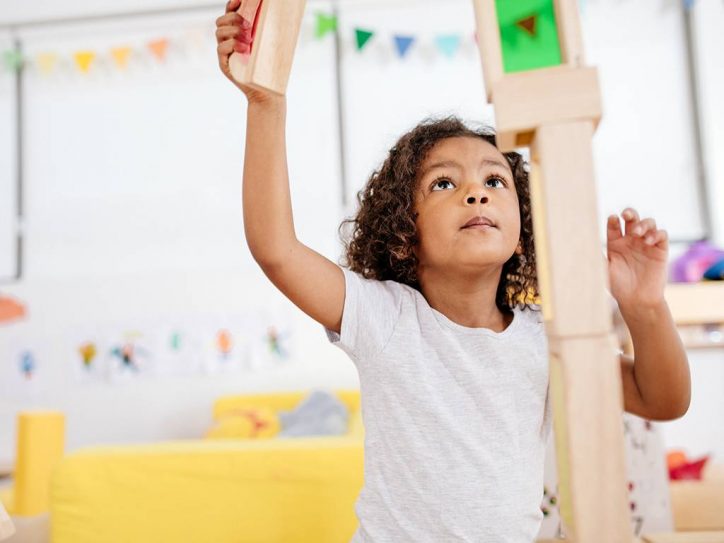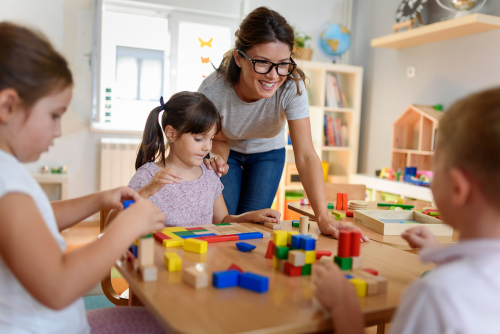Comprehending the Value of Day Care for Your Kid's Social Growth and Knowing Experiences Through Engaging Activities
The importance of daycare in shaping a kid's social advancement and knowing can not be overstated, as it provides a structured environment filled with appealing activities that are pivotal for early growth. As we check out the multifaceted benefits of childcare, one must take into consideration just how these fundamental experiences affect a youngster's future social interactions and total growth.
:max_bytes(150000):strip_icc()/kids-at-daycare-86c34014a9f94dceb6849433dae17bfc.jpg)
Benefits of Social Communication
Social interaction plays a critical function in the developmental trajectory of young children, functioning as a structure for essential social skills. Involving with peers allows kids to practice communication, learn to express their feelings, and create compassion. With shared play and teamwork, they begin to recognize social norms, such as taking turns and sharing, which are vital elements of successful social partnerships.
Furthermore, social interactions add to cognitive growth. As young children communicate with their peers, they boost their language abilities, broaden their vocabulary, and improve their ability to articulate feelings and thoughts. This exchange of concepts fosters important reasoning, as kids learn to bargain, resolve troubles, and browse conflicts.
In addition, social interaction promotes emotional guideline. Direct exposure to various social scenarios aids toddlers recognize and handle their emotions, eventually bring about greater strength and flexibility. The capacity to form relationships and accessories additionally enhances their sense of belonging and self-worth, which are critical for total health.
Significance of Involving Activities
Engaging tasks are crucial for cultivating a revitalizing atmosphere that improves young children' social advancement. These tasks not just captivate kids's attention but additionally promote energetic participation, allowing them to explore their environments creatively. Through play-based discovering, toddlers develop necessary skills such as problem-solving, participation, and compassion, all of which are important for building healthy and balanced partnerships with peers.
Taking part in appealing activities, such as team games, art tasks, and interactive narration, urges young children to express their concepts and feelings. This expression is vital for emotional knowledge and assists them recognize the perspectives of others. When young children engage in these tasks together, they find out to discuss roles, share resources, and collaborate, which are basic elements of social communication.
On top of that, a well-structured setting that consists of varied and stimulating tasks assists in keeping young children encouraged and focused. This motivation cultivates a love for learning and expedition, laying the foundation for future academic experiences. Eventually, involving tasks in daycare setups are pivotal in shaping social abilities, preparing young children for effective communications past the classroom, and nurturing their general growth during these developmental years.
Developing Communication Skills
Effective interaction skills are critical for kids as they navigate their early social interactions. In a daycare setup, kids are subjected to diverse social situations that urge spoken and non-verbal interaction. Talking with caregivers and peers cultivates language development, enabling young children to reveal their feelings, demands, and ideas more efficiently.

In addition, childcare environments offer chances for kids to observe and imitate communication designs of their adults and peers. This observational discovering is crucial as children choose up on social signs, tone, and body movement, which are necessary elements of effective communication.
Promoting Freedom and Confidence
As toddlers improve their interaction abilities, they concurrently start to discover their independence and construct confidence in social settings (infant daycare near me). Day care provides a structured atmosphere where youngsters can participate in various activities that encourage autonomy. From picking their very own tasks to taking part in group jobs, these experiences equip toddlers to make choices and express themselves
In a childcare setting, children are often provided with chances to resolve troubles independently, whether it's finding out how to share playthings or fixing problems with peers. This fosters essential reasoning and advertises self-reliance. Furthermore, caretakers sustain this growth by offering favorable support and support, aiding youngsters to navigate social communications with self-confidence.

Team tasks, such as participating video games or collective art jobs, help with team effort and show kids the significance of interacting. Via these communications, children find out to connect their sensations and ideas, better improving their self-worth and social skills.
Ultimately, cultivating independence and self-confidence in childcare not just prepares young children for future social environments however likewise lays the foundation for a durable mindset, furnishing them with crucial life skills as they remain to expand and learn.
Structure Lifelong Knowing Structures
A strong structure for long-lasting understanding is vital for young children, as their early you can look here experiences form their mindsets in the direction of education and inquisitiveness. Daycare environments play a critical role in this developing stage by offering organized chances for expedition and engagement. Engaging activities, such as group play, arts and crafts, and interactive narration, stimulate cognitive development while motivating social interaction.
With these experiences, young children find out crucial abilities such as analytic, interaction, and participation. They are introduced to the principle of discovering as an enjoyable, joint process instead than a job, which cultivates a favorable perspective in the direction of education and learning. Exposure to varied point of views and peer interactions in childcare have a peek at these guys settings enhances emotional knowledge, advertising empathy and resilience.
Caregivers and teachers likewise add significantly to developing this foundation by modeling interest and excitement for learning. By urging concerns and helping with conversations, they develop an atmosphere where children feel safe to express themselves and explore new ideas. Eventually, the combination of helpful partnerships and interesting activities in childcare settings lays the groundwork for a long-lasting love of knowing, gearing up kids with the skills and mindset needed for future scholastic and individual success.
Conclusion

The relevance of daycare in shaping a young child's social development and knowing can not be overemphasized, as it offers a structured environment loaded with appealing activities that are essential for early growth.Social communication plays a crucial role in the developing trajectory of young children, serving as a foundation for essential social abilities. When young children engage in these tasks with each other, they find out to negotiate roles, share resources, and collaborate, which are fundamental facets of social communication.
Ultimately, engaging activities learn this here now in day care setups are essential in shaping social skills, preparing kids for effective communications past the classroom, and supporting their general advancement throughout these developmental years.
Inevitably, the advantages of engaging activities in daycare settings play a substantial role in preparing toddlers for future social communications and difficulties. infant daycare near me.